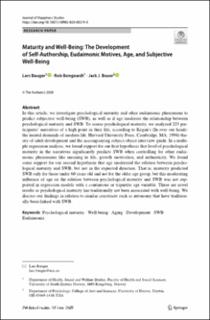Maturity and Well-Being: The Development of Self-Authorship, Eudaimonic Motives, Age, and Subjective Well-Being
Peer reviewed, Journal article
Published version
Permanent lenke
https://hdl.handle.net/11250/2731856Utgivelsesdato
2020Metadata
Vis full innførselSamlinger
Originalversjon
Bauger, L., Bongaardt, R. & Bauer, J. J. (2020). Maturity and Well-Being: The Development of Self-Authorship, Eudaimonic Motives, Age, and Subjective Well-Being. Journal of Happiness Studies. https://doi.org/10.1007/s10902-020-00274-0Sammendrag
In this article, we investigate psychological maturity and other eudaimonic phenomena to predict subjective well-being (SWB), as well as if age moderate the relationship between psychological maturity and SWB. To assess psychological maturity, we analyzed 223 par-ticipants’ narratives of a high point in their life, according to Kegan’s (In over our heads: the mental demands of modern life, Harvard University Press, Cambridge, MA, 1994) the-ory of adult development and the accompanying subject-object interview guide. In a multi-ple regression analysis, we found support for our first hypothesis that level of psychological maturity in the narratives significantly predicts SWB when controlling for other eudai-monic phenomena like meaning in life, growth motivation, and authenticity. We found some support for our second hypothesis that age moderated the relation between psycho-logical maturity and SWB, but not in the expected direction. That is, maturity predicted SWB only for those under 60 years old and not for the older age group, but this moderating influence of age on the relation between psychological maturity and SWB was not sup-ported in regression models with a continuous or tripartite age variable. These are novel results as psychological maturity has traditionally not been associated with well-being. We discuss our findings in relation to similar constructs such as autonomy that have tradition-ally been linked with SWB.

